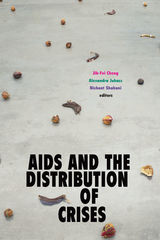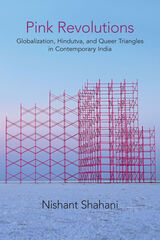2 books about Shahani, Nishant

AIDS and the Distribution of Crises
Jih-Fei Cheng, Alexandra Juhasz, and Nishant Shahani, editors
Duke University Press, 2020
AIDS and the Distribution of Crises engages with the AIDS pandemic as a network of varied historical, overlapping, and ongoing crises born of global capitalism and colonial, racialized, gendered, and sexual violence. Drawing on their investments in activism, media, anticolonialism, feminism, and queer and trans of color critiques, the scholars, activists, and artists in this volume outline how the neoliberal logic of “crisis” structures how AIDS is aesthetically, institutionally, and politically reproduced and experienced. Among other topics, the authors examine the writing of the history of AIDS; settler colonial narratives and laws impacting risk in Indigenous communities; the early internet regulation of both content and online AIDS activism; the Black gendered and sexual politics of pleasure, desire, and (in)visibility; and how persistent attention to white men has shaped AIDS as intrinsic to multiple, unremarkable crises among people of color and in the Global South.
Contributors. Cecilia Aldarondo, Pablo Alvarez, Marlon M. Bailey, Emily Bass, Darius Bost, Ian Bradley-Perrin, Jih-Fei Cheng, Bishnupriya Ghosh, Roger Hallas, Pato Hebert, Jim Hubbard, Andrew J. Jolivette, Julia S. Jordan-Zachery, Alexandra Juhasz, Dredge Byung'chu Kang-Nguyễn, Theodore (Ted) Kerr, Catherine Yuk-ping Lo, Cait McKinney, Viviane Namaste, Elton Naswood, Cindy Patton, Margaret Rhee, Juana María Rodríguez, Sarah Schulman, Nishant Shahani, C. Riley Snorton, Eric A. Stanley, Jessica Whitbread, Quito Ziegler
Contributors. Cecilia Aldarondo, Pablo Alvarez, Marlon M. Bailey, Emily Bass, Darius Bost, Ian Bradley-Perrin, Jih-Fei Cheng, Bishnupriya Ghosh, Roger Hallas, Pato Hebert, Jim Hubbard, Andrew J. Jolivette, Julia S. Jordan-Zachery, Alexandra Juhasz, Dredge Byung'chu Kang-Nguyễn, Theodore (Ted) Kerr, Catherine Yuk-ping Lo, Cait McKinney, Viviane Namaste, Elton Naswood, Cindy Patton, Margaret Rhee, Juana María Rodríguez, Sarah Schulman, Nishant Shahani, C. Riley Snorton, Eric A. Stanley, Jessica Whitbread, Quito Ziegler
[more]

Pink Revolutions
Globalization, Hindutva, and Queer Triangles in Contemporary India
Nishant Shahani
Northwestern University Press, 2021
Pink Revolutions describes how queer politics in India occupies an uneasy position between the forces of neoliberal globalization, on the one hand, and the nationalist Hindu fundamentalism that has emerged since the 1990s, on the other. While neoliberal forces use queerness to highlight India’s democratic credentials and stature within a globalized world, nationalist voices claim that queer movements in the country pose a threat to Indian national identity. Nishant Shahani argues that this tension implicates queer politics within messy entanglements and knotted ideological triangulations, geometries of power in which local understandings of “authentic” nationalism brush up against global agendas of multinational capital.
Eschewing structures of absolute complicity or abject alterity, Pink Revolutions pays attention to the logics of triangulation in various contexts: gay tourism, university campus politics, diasporic cultural productions, and AIDS activism. The book articulates a framework through which queer politics can challenge rather than participate in neoliberal imperatives, an approach that will interest scholars engaged with queer studies and postcolonial scholarship, as well as activists and academics wrestling with global capitalism and right-wing regimes around the world.
Eschewing structures of absolute complicity or abject alterity, Pink Revolutions pays attention to the logics of triangulation in various contexts: gay tourism, university campus politics, diasporic cultural productions, and AIDS activism. The book articulates a framework through which queer politics can challenge rather than participate in neoliberal imperatives, an approach that will interest scholars engaged with queer studies and postcolonial scholarship, as well as activists and academics wrestling with global capitalism and right-wing regimes around the world.
[more]
READERS
Browse our collection.
PUBLISHERS
See BiblioVault's publisher services.
STUDENT SERVICES
Files for college accessibility offices.
UChicago Accessibility Resources
home | accessibility | search | about | contact us
BiblioVault ® 2001 - 2024
The University of Chicago Press









